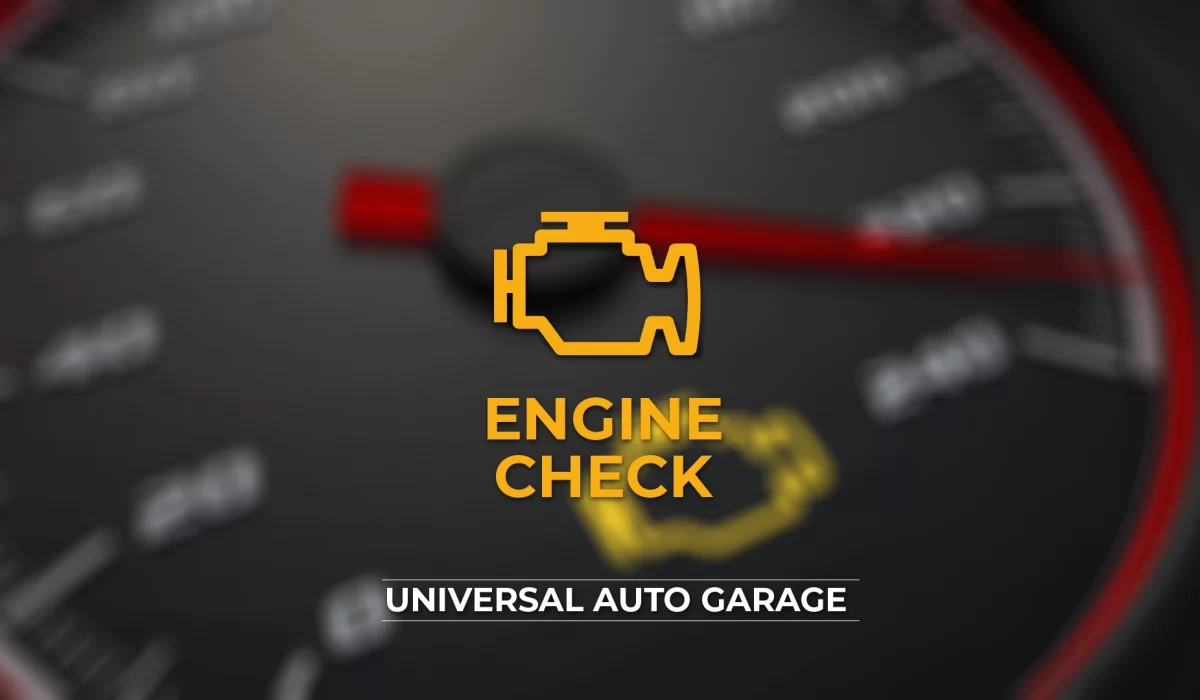Seeing the check engine light illuminate on your dashboard can be alarming, and you may find yourself wondering if it’s safe to continue driving. At Universal Auto Garage, we understand the uncertainty this brings, and we’re here to shed light on what you should do when this happens.
What Does the Check Engine Light Mean?
The check engine light, part of your car’s onboard diagnostics system, indicates that something isn’t quite right. It can be triggered by various issues, ranging from a loose gas cap to more serious engine problems. Ignoring this light can lead to more significant damage and costly repairs down the road.
Immediate Steps to Take
- Check the Gas Cap: A loose or damaged gas cap can trigger the check engine light. Ensure it’s tightened properly and see if the light turns off after driving a few miles.
- Observe the Car’s Performance: Pay attention to any unusual sounds, reduced power, or vibrations. These signs can indicate a more serious issue that needs immediate attention.
- Reduce Speed and Load: If your car seems to be running fine, reduce your speed and avoid heavy loads. This can help minimize further damage until you can have it checked.
- Get a Diagnostic Scan: Head to a trusted auto repair shop like Universal Auto Garage for a diagnostic scan. This will pinpoint the exact issue causing the light to turn on.
When It’s Safe to Drive
If there are no noticeable changes in how your car is running, it may be safe to continue driving for a short period. However, you should still get it checked as soon as possible to prevent potential problems.
When to Stop Driving Immediately
Certain symptoms indicate you should stop driving and seek immediate assistance:
- Flashing Check Engine Light: This signals a severe issue, such as a misfire, which can damage the catalytic converter if ignored.
- Strange Noises: Knocking, tapping, or loud engine noises can indicate serious engine problems.
- Poor Performance: If your car struggles to accelerate, runs roughly, or stalls, it’s best to avoid driving.
- Overheating or Low Oil Pressure: These can cause catastrophic engine damage. If these warnings accompany the check engine light, stop driving and get professional help.
Preventative Measures
Regular maintenance is key to preventing check engine light issues. Here are some tips:
- Routine Inspections: Regularly scheduled maintenance checks can catch potential problems early.
- Timely Oil Changes: Fresh oil keeps the engine running smoothly and prevents wear.
- Replace Filters: Air and fuel filters should be replaced according to your car’s maintenance schedule.
- Monitor Fluid Levels: Keep an eye on coolant, transmission fluid, and brake fluid levels.
Conclusion
While it may be tempting to ignore the check engine light, doing so can lead to more significant issues and expensive repairs. At Universal Auto Garage, we recommend addressing the light promptly to ensure your vehicle remains in optimal condition. If you notice the light on, don’t hesitate to bring your car to us for a thorough inspection. Your safety and your car’s health are our top priorities.
Need assistance with your check engine light? Contact Universal Auto Garage today!
GET IN TOUCH
Experiencing car troubles? Don’t worry—our team is here to assist you. Feel free to reach out to us for expert assistance!

